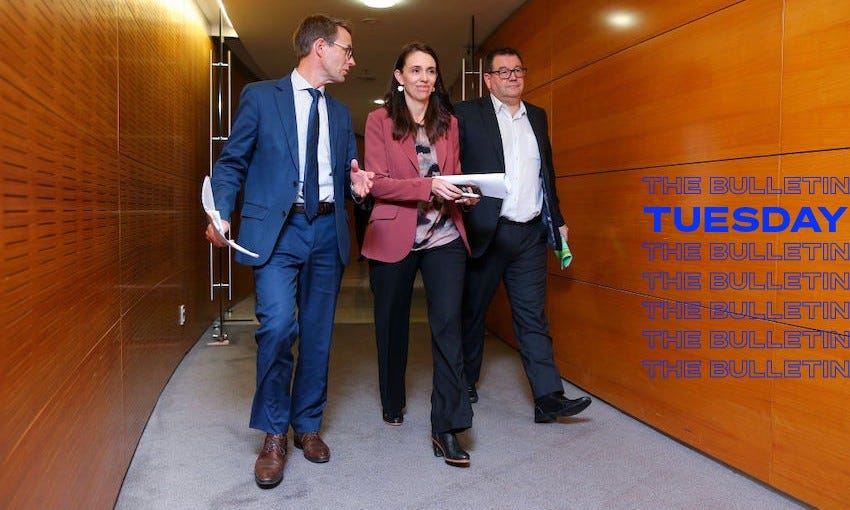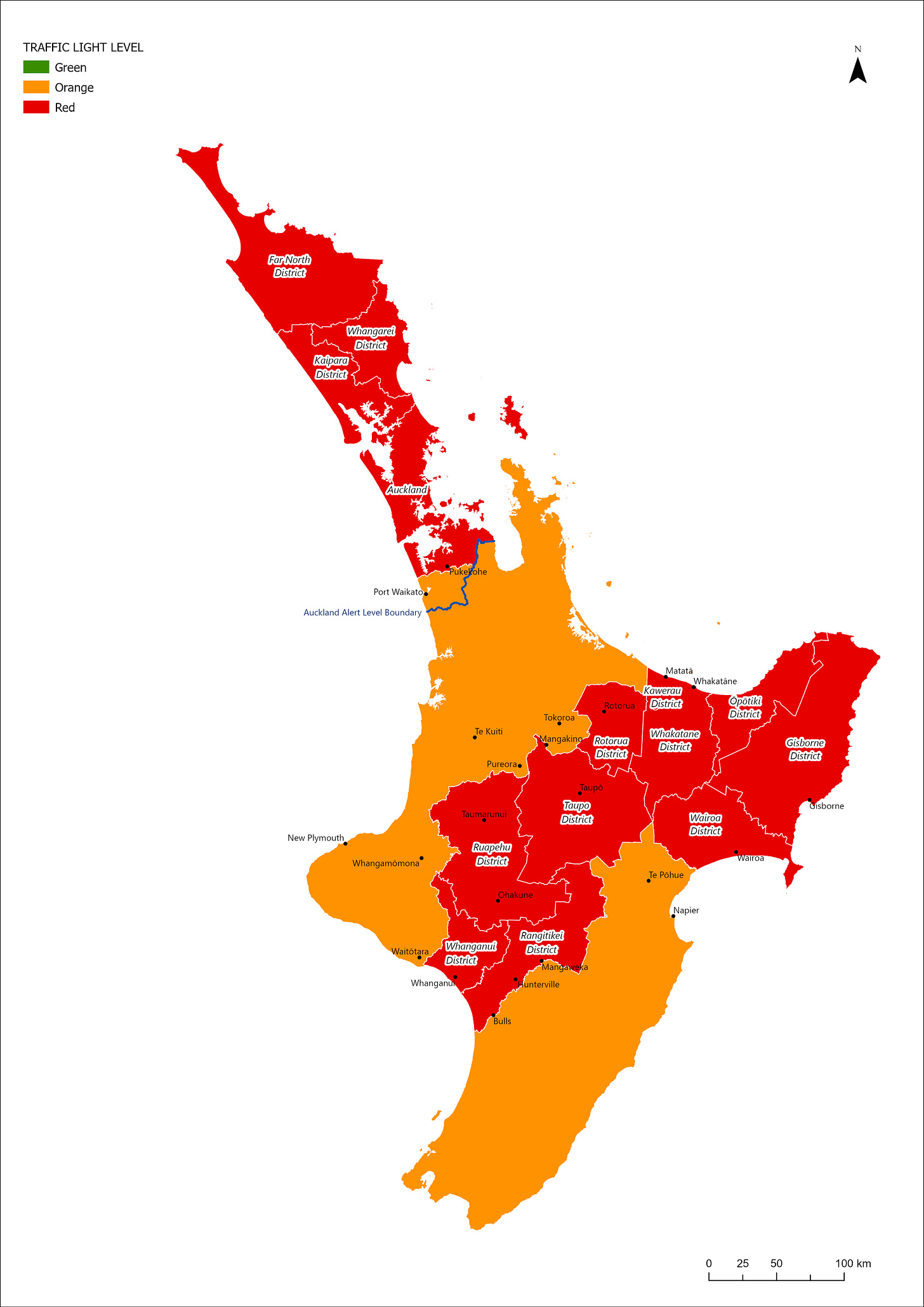A red and orange summer
The South Island will head into the orange level as the country adopts the traffic light system on Friday, things are a bit more complicated for the North Island
Mōrena and welcome to The Bulletin for Tuesday, November 30, by Justin Giovannetti. Presented in partnership with Z Energy.
In today’s edition: National votes for a new leader; deaths in home isolation were preventable; keep wearing your fabric masks; but first, the traffic light map is revealed.
Elimination ends with the alert levels on Friday as New Zealand moves to the traffic light approach to managing Covid-19 (Pool/Getty Images).
New Zealand’s plan for summer. The country will wake up on Friday morning to a new traffic light system designed to manage Covid-19 for the foreseeable future. Most Aucklanders will emerge to a new measure of personal freedom under a red level and the end of a lockdown that has lasted 15 weeks. However for hundreds of thousands of unvaccinated New Zealanders, both in Auckland and across the motu, Friday will mark the start of significant restrictions going forward. Alice Neville has written for The Spinoff about yesterday’s announcement by the prime minister of which regions will be headed into the orange and red levels. In short, the South Island and lower North Island will be orange, while the upper half of the North Island is largely red. Jacinda Ardern confirmed that no part of the country will go to the green level this summer.
Cabinet will review the settings in two weeks, on December 13, and then they are likely to remain frozen until January 17. It might be useful to familiarise yourself with this map of the country as you consider your holiday plans:
The traffic light levels for the North Island, the south is all orange at this time.
This summer you need to “mask, scan and pass”. As a quick reminder, red is similar to level two when vaccine passes are used, which means capacity limits and social distancing. At orange, there are no limits when vaccine passes are used. Once the Auckland border opens on December 15 for those who are fully vaccinated or recently tested, most New Zealanders will be free to travel around the country regardless of what level a region is in. According to Newshub, some rules of the system were modified in recent days for unvaccinated people, but the overall traffic lights haven’t changed much.
A one-off payment will be made to help businesses in Auckland, Waikato and Northland. The NZ Herald reports that some businesses will receive up to $24,000 to help them get running again after months of lockdown restrictions. The entire programme could cost up to $490 million, according to the Treasury. Wage subsidies and most business support programmes are expected to end under the traffic light system, after billions spent over the past two years. The finance minister said he’ll report back to cabinet next year if some subsidies are still needed under red, or for any regional lockdowns that could take place. Auckland businesses told Stuff that while they are happy with the cash, they only really have three weeks to open before Christmas hits and shoppers disappear on their summer holidays.
Reopening is taking place against a spreading omicron variant. Despite repeated assurances from the prime minister that the traffic light system offers more protection than the alert levels due to the introduction of vaccine passes, experts say that isn’t so. In a comment to the Science Media Centre, epidemiologist Amanda Kvalsvig said that an upgraded alert level system would be a better move for the country right now:
“The key issue with the traffic light system is that it’s designed around incentivising New Zealanders to get vaccinated. It’s significantly underpowered for meaningful prevention of Covid-19 outbreaks. That’s a major and concerning gap in our pandemic response just now as we await further information on the omicron variant.”
Michael Plank, with Te Pūnaha Matatini, shared many of the same concerns and added that because the government moved to the new system before 90% full vaccination was achieved, some areas will have large gaps in coverage: “The virus will find and exploit these gaps so we must redouble our efforts to fill them.”
A message from The Spinoff’s new editor Madeleine Chapman:
Like any good door-to-door salesperson, I’m about to cheerily introduce myself and then, in the very next breath, ask you for money. Hi! I’m Madeleine (or Mad) Chapman, previously an intern at The Spinoff, then a staff writer, senior writer and now editor. It certainly wasn’t the plan to step into this role in the middle of a delta outbreak, nor did I think my first weeks on the job would unfold alongside New Zealand’s largest city slowly coming out of stagnation. But despite the strange and unfortunate circumstances, The Spinoff team has stepped up once again, working tirelessly (and mostly from our bedrooms) to bring you the most important news when you need it, and the lighter moments when things are looking a little bleak. We’ve been able to continue this work because of the ongoing contributions from our members and I can’t thank you enough.
But can I boldly ask that you consider becoming a member if you aren’t one already? If you’ve read something on our site recently that you enjoyed or appreciated, consider it a koha for that alone, because every dollar donated through The Spinoff Members is used to create more of the work you see every day. With Christmas around the corner (which I’m finding genuinely hard to believe), there’s no such thing as shipping delays on a membership of The Spinoff bought for whānau and friends.
National leadership vote on a ‘knife-edge’ between Bridges and Luxon. Multiple sources in the press gallery are reporting this morning that there likely won’t be a coronation today in the National party, as Simon Bridges and Chris Luxon are both competing for votes. Stuff reports that there was a last-minute effort on Monday to secure some type of deal to avoid a protracted caucus struggle today. According to the NZ Herald, Luxon is believed to be slightly ahead in votes, but some MPs are wavering. At 3pm caucus will meet for a choice between the known, but possibly unpopular Bridges, and the unknown rookie that is Luxon.
The Covid numbers: There are 93 cases in hospital and 10 in ICU/HDU. There are now 8,298 cases in the delta outbreak. 167 new community cases were reported in Auckland yesterday, 10 in Waikato and 5 in Northland. 11,719 people were vaccinated on Sunday.
The Spinoff’s Covid data tracker has the latest figures.
The deaths of two men isolating at home were potentially preventable. An independent review of failures in self-isolation has painted a grim picture of a system that’s severely overloaded. Toby Manhire reports for The Spinoff on the cases of two men who died at home in recent weeks as calls went unanswered and medical officials didn’t respond to red flags. While there have been moves in recent days to patch up the system, it’s an upsetting read. Some of those fixes also won’t be ready for weeks or months, as people are hired and new organisations are created.
At some point this week, the country is likely to pass a statistical milestone: More than half of all Covid-19 cases ever detected in New Zealand will be active cases. The rest will have recovered at some point over the past two years.
The omicron variant is spreading, putting Australia’s reopening plans in doubt. Learning more about the concerning variant could take weeks, but it has now been detected in the Netherlands, Denmark and Canada—along with a dozen other countries. Japan, the world’s third largest economy, is shutting its borders to all foreigners. As Reuters reports, Australia had planned to open its border to students and skilled workers from tomorrow, but that might not happen. Canberra hasn’t announced its plans, but two weeks of mandatory isolation at the border probably won’t be necessary for now.
Man dead, four police officers in hospital after two incidents in Auckland. Police commissioner Andrew Coster and prime minister Jacinda Ardern faced tough questions yesterday after three officers were shot and a fourth was hit by a fleeing vehicle in a separate incident. A man was killed in west Auckland after setting fire to a Kāinga Ora house and shooting at police, after they spent 30 minutes trying to disarm him. Newshub reports that some residents in the suburb say they feel unsafe after a number of gun incidents and crimes in recent weeks. Police say they are focused on removing guns from the community.
Fabric masks are actually fine, say researchers. After a story in RNZ last week left many people with the impression that fabric masks don’t work, Naomii Seah spoke with the authors of the study that was cited. In her story for The Spinoff, she found that the findings were a little mangled. The work shows that single-use medical masks can be cleaned and used a number of times, which is useful in areas where people don’t have other options. The authors didn’t even test fabric masks. Just keep wearing a face mask, medical or otherwise.
Got some feedback about The Bulletin, or anything in the news?
Get in touch with me at thebulletin@thespinoff.co.nz
Right now on The Spinoff: Madeleine Holden has tried to curb her phone addiction in many ways, she rates them all. Toby Manhire looks at how the National party got to where it is today, preparing for another leadership vote. Anna Rawhiti-Connell talks about the country’s drinking and starts with herself. Chris Schulz writes that Auckland is losing it after months of lockdown.
For a longer read today, the key weeks when New Zealand went from nearly eliminating delta to defeat. Using a pile of documents released by the government on Friday, Newsroom’s Marc Daalder has pieced together how the Covid-19 response fell apart—there are now more than 8,000 cases and the country has abandoned elimination, there’s no easier way to put it. He finds a crucial two week window which began with an optimistic assessment to cabinet on September 20 that the situation was under control and recommended a move to level three, followed a fortnight later by the admission that things had moved in the wrong way very quickly.
There’s something broken with Cycling NZ. Writing in The Bounce, Dylan Cleaver says it’s time to tear the cycling organisation to the ground and start over. It’s in the middle of its third major inquiry in less than a decade and the findings so far have been appalling. For a sense of why, read this outstanding investigation from the NZ Herald’s (paywalled) Tom Dillane that looks at cycling and the death of Olivia Podmore.
That's it for The Bulletin. If you want to support the work we do at The Spinoff, please check out our membership programme.








